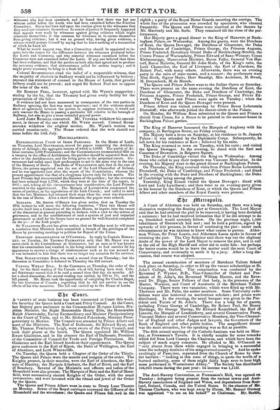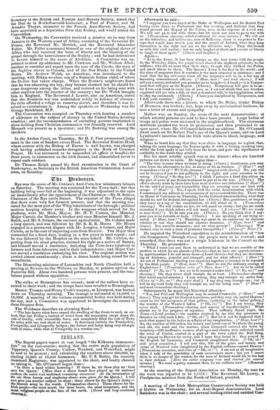'be Iftetropotis.
A Court of Alderman was held on Saturday, and there was a. long discussion respecting the floating pier at Greenwich. The Lord Mayor said that he had ordered the pier to be removed, it having been declared, a nuisance ; but he had received intimation that if he did attempt to do so, bloodshed would certainly follow. On the previous night, 1,500 inhabitants of Greenwich had met ; and he held a petition, signed by upwards of 250 persons, in favour of continuing the pier : under such circumstances he was anxious to know what course to pursue. Alder,- man Wilson, Sir Peter Laurie, and Alderman Lucas spoke in favour of retaining the pier. The City Solicitor said there was not the slightest doubt of the power of the Lord Mayor to remove the pier, and to call in the aid of the High. Sheriff and other aid to assist him: but perhaps, the better coarse would be to leave the matter until the next Court of Conservancy, and eventually to settle it by a jury. After a long dis- cussion, that course was adopted.
The annual examination of monitors of Merchant Tailors School took place on Saturday, in order to fill up the vacant scholarships at St. John's College, Oxford. The examination was conducted by the Reverend P. Wynter, D.D., Vice-Chancellor of Oxford and Pre- sident of St. John's, the Reverend William Hunter, and the Reve- rend Dr. Higgs, Senior Fellows of that body, in the presence of the Master, Wardens, and Court of Assistants of the Merchant Tailors Company. There were two vacancies; which were filled up with Mr. Thornton and Mr. Palin, the senior monitors. Some University exhi- bitions were also bestowed on meritorious scholars ; and prizes were distributed. In the evening, the usual banquet was given to the Pre- sident and Tutors of St. John's. There was a long list of guests, including Prince George of Cambridge, Sir Robert Peel, Sir Henry Hardinge, Sir George Murray, Sir Edward Kuatchbull, the Earl of Lincoln, the Marquis of Londonderry, and several Conservative Peers, Viscount Mahon and several Conservative Members, the Vice-Chancel- lor of England and other Judges and lawyers, the Governors of the Bank of England and other public bodies. The magnificent dinner was the main attraction, for the speaking was as flat as possible.
The fifth annual meeting of the Catholic Institute was held on Mon- day, at Freemason's Tavern. It is chiefly notable for some remarks which fell from Lord Camoys the Chairman, and which have been the subject of much angry comment. He alluded to Mr. O'Connell as " only absent from them while engaged in bringing to a successful issue the unhappy destinies of his misgoverned country.'" And he spoke exultingly of Puseyism, separated from the Church of Rome by slen- der barriers ; " looking at this state of things, to quote the words of a learned authority, some of them might fairly hope soon to hear high mass performed in Westminster Abbey." The Society, has. distributed 104,923 tracts. during the past year : its income was 1,1121.
The Anti-Slavery Convention, at Freemason's Hall, was opened on Tuesday ; delegates being present from the various towns and Anti& Slavery associations of England and Wales, and deputations from Scale laud, Ireland, Canada, and the United States. In the absence of Mn Thome& Clarkson, who was kept away by illness, Mr. Samuel Gurney was appointed " to act on his behalf " as Chairman. Mr. &able;
Secretary to the British and Foreign Anti-Slavery Society, stated that the Due de la Rochefoucauld-Liancourt, a Peer of France, and M. Amadee Thayer, treasurer to the French Anti-Slavery Society, had been appointed as a deputation from that Society, and would attend the Convention.
On Wednesday, the Convention received a mission on its way from Jamaica to the Western coast of Africa, consisting of the Reverend Dr. Prince, the Reverend Mr. Merrick, and the Reverend Alexander Fuller. Mr. Fuller announced himself as one of the original slaves of Africa who bad received the boon of liberty and the blessing of the gospel through the benevolence of the Society ; and he had determined to devote himself to the cause of Abolition. A Committee was ap- pointed to draw up addresses to Mr. Clarkson and Mr. William Allen ; another to consider and report upon the case of the Creole, the state of the fugitive slaves in Canada, and of the free Blacks in the United States. Dr. Andrew Welsh, an American, was introduced to the meeting, with Nikka-no-thee, son of a Seminole Indian chief, of whom the Doctor had taken charge. When the Doctor's neighbours found that he was educating the boy, they became alarmed lest he should be- come dangerous among the tribes, and insisted on his being sent with other captives into the interior of the country; but Dr. Welsh brought him to England. The Reverend J. Leavitt, also an American, stated that the Seminole war was undertaken solely in defence of slavery : the tribe afforded a refuge to runaway slaves, and therefore it was re- solved to exterminate it. Among the speakers on Wednesday was Sir George Strickland, M.P. The Convention was occupied on Thursday with hearing a number of addresses on the subject of slavery in the United States, detailing cruelties ; and the recommendation of excluding persons implicated in slave-holding from Christian communion was formally renewed. Lord Morpeth was present as a spectator ; and Dr. Bowring was among the speakers.
In the Arches Court, on Thursday, Sir H. J. Fast pronounced judg- ment in the case of Sanders versus Head. The Reverend Erskine Head, whose contest with the Bishop of Exeter is well known, was charged with having published remarks derogatory to the Book of Common Prayer. He was sentenced to be suspended :al, 4ficio et beneficio for three years, to commence on the 25th instant, and admonished never to repeat such conduct.
Dr. Thomas Rolph passed his final examination in the Court of Bankruptcy, as Secretary to the British American Colonization Associ- ation, on Saturday.



























 Previous page
Previous page